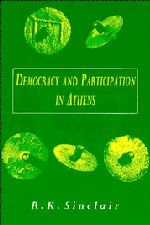Book contents
- Frontmatter
- Contents
- Preface
- Maps
- 1 The Athenian polis and the evolution of democracy
- 2 The privileges and the opportunities of the citizen
- 3 The responsibilities of the citizen
- 4 The sovereignty of the Demos, officials and the Council
- 5 Citizens and participation
- 6 The hazards of leadership
- 7 The rewards of leadership
- 8 The critics of Athenian democracy
- Appendix 1 The population of Athens
- Appendix 2 ‘Working days’
- Appendix 3 Notes on three constitutional matters
- Bibliography
- Index
4 - The sovereignty of the Demos, officials and the Council
Published online by Cambridge University Press: 01 June 2011
- Frontmatter
- Contents
- Preface
- Maps
- 1 The Athenian polis and the evolution of democracy
- 2 The privileges and the opportunities of the citizen
- 3 The responsibilities of the citizen
- 4 The sovereignty of the Demos, officials and the Council
- 5 Citizens and participation
- 6 The hazards of leadership
- 7 The rewards of leadership
- 8 The critics of Athenian democracy
- Appendix 1 The population of Athens
- Appendix 2 ‘Working days’
- Appendix 3 Notes on three constitutional matters
- Bibliography
- Index
Summary
The accountability of officials to the Demos
While the citizen (politēs) shared in all the facets of the life of the polis, his citizenship (politeia), his membership of the community of citizens, was most distinctively worked out in what we have called the political–judicial area. Attention may therefore be focussed on various political–judicial institutions and, in particular, on the question of how they were related to the central feature of Athenian democracy, the sovereignty of the Demos. These institutions were not static throughout our period and some were directly affected by the developments that have already been discussed. Quite apart from actual changes in the constitutional structure and procedures, developments such as the tendency to specialisation in the fourth century or shifts in the character of the strategia affect any evaluation of the structure of Athenian democracy. Changes in the socio-economic origins of leaders and other changes also had an impact on the actual operation of democratic institutions. Yet despite all the changes which affected, directly or indirectly, the supreme authority of the Demos, certain devices or factors contributed more or less constantly to the maintenance of that sovereignty in our period.
Rotation and other factors worked strongly, as we have seen, in encouraging the involvement of large numbers of citizens. These factors combined with the involvement of large numbers of citizens to make it more difficult for men from aristocratic families to retain their pre-eminence and for powerful individuals or groups to emerge that might challenge the control of the Demos.
- Type
- Chapter
- Information
- Democracy and Participation in Athens , pp. 77 - 105Publisher: Cambridge University PressPrint publication year: 1988

